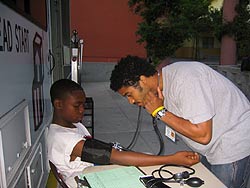Berkeleyan
Grant boosts diversity program for undergraduate science students
![]()
| 10 November 2004
A $5.6-million, five-year grant to the campus Biology Scholars Program (BSP), announced on Tuesday, aims to increase the number of Berkeley students from underserved communities who are admitted to medical schools and graduate science programs throughout the country.
 BSP member Kenneth D’Oyen (right) volunteers with a group called Kerry’s Kids to bring free health care to children in underserved communities. (Photo courtesy the Biology Scholars Program) |
The grant was made by the San Francisco-based Gordon and Betty Moore Foundation. Said Chancellor Robert Birgeneau: “This generous grant is going to pay dividends not only for our students but for the communities they will serve when they complete their studies. We could not be more grateful to the Gordon and Betty Moore Foundation or more proud of the success of the Biology Scholars Program.”
The BSP was established on campus in 1992 to help undergraduate students from diverse social, cultural, and economic backgrounds succeed in the biological sciences. More than 800 students have graduated from the program, and 450 are currently enrolled.
The grant is part of the foundation’s focus on giving money to higher-education mentoring programs for underrepresented students, particularly those in the math, science, and technology fields.
“This is about providing students with resources and a structured developmental approach,” said BSP Director John Matsui. “This is not about hand-holding.”
Matsui described the 12-year old program as “wildly successful,” noting that participants — 75 percent of whom come from economically disadvantaged backgrounds — graduate with a biology degree at the same rate (and with equivalent grade-point averages) as do Asian and white students who are not in the program. Minority students in the program are one-and-a-half times more likely to graduate with a biology degree than are minority students who do not participate in the program.
The new grant (developed by BSP Assistant Director Roger Liu, Program Assistant Marco Angulo, and Matsui) has three specific goals:
• Providing additional mentoring and academic resources each year to 100 students seeking a science degree;
• Providing 60 pre-med students each year with mentoring, medical internships, and financial assistance to attend conferences and pay for medical-school applications and review courses;
* Sharing Berkeley’s BSP model with 40 to 50 four-year colleges and universities in the state, resulting in the creation of at least 10 similar programs
The Moore Foundation grant will enable BSO members from underserved communities — such as ethnic minorities, lower income students or those who are the first in their families to attend college — to become competitively qualified for admission into medical schools and graduate programs that lead to science careers.
Ricardo Gomez, a 2001 Berkeley graduate, said the program helped him prepare for his work today as a medical student at UCLA/Drew, a joint training program between UCLA and Drew University in which students commit to serving disadvantaged populations.
“A lot of times, when you come to a big institution, they just throw you to the wolves and you need to fend for yourself. If you have something as simple as a set study group, it’s structure you don’t even know about,” said Gomez, who was raised in a small town in the Central Valley. “Once you have that structure, it’s hard to imagine success without it.”
Currently, African American, Hispanic and American Indian health-care workers collectively make up only 9 percent of nurses, 6 percent of doctors and 5 percent of dentists in this country.
“There is a huge underrepresentation problem here,” Matsui said. “And there is particular demand for health care professionals from underrepresented and underserved populations.” The Moore Foundation Grant stipulates that the students commit to practicing in underserved communities.
“It’s critical that future physicians reflect and appreciate the diversity of our communities and understand the cultural differences and norms of underrepresented communities,” said Dr. Tomás Magaña, who works at Children’s Hospital and Research Center at Oakland. Magaña will be one of the two physicians providing mentoring to Berkeley pre-med students under the grant.
“There are many complex reasons why individuals won’t seek health care services, and many are related to cultural issues,” Magaña said. “If our future physicians can effectively understand and address these issues, patients will more likely get regular health care and have better health outcomes.”
The Biology Scholars Program was started with funds from the Howard Hughes Medical Institute (HHMI) under the direction of Matsui; Corey Goodman, formerly a UC Berkeley professor of neurobiology and an HHMI investigator; and Caroline Kane, UC Berkeley professor in residence of biochemistry and molecular biology. The program is in its twelfth year of HHMI funding.
For information about the Biology Scholars Program, visit bsp.berkeley.edu.

